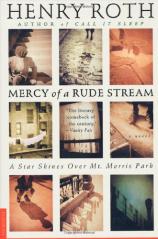Reading Group Guide
Discussion Questions
Mercy of a Rude Stream Series

1. The title Mercy of a Rude Steam is taken from Cardinal Woolsy's speech in Shakespeare's "Henry VIII" (which serves as the epigraph for the first book in the series). It has been observed that Henry Roth viewed mankind, and particularly himself, as a "rude stream," a metaphor for the flaws and frailties of our mortal lives. Does the elderly Ira Stigman believe or not believe in the possibility of mercy for himself, mankind and the modern Jew?
2. On the opening page of A Star Shines Over Mt. Morris Park, Ira laments his upheaval from the all-Jewish neighborhood of his boyhood to non-Jewish Harlem. "If it had only happened a few years later. Everything else could be the same, the war, the new relatives; if only he could have had, could have lived a few more years on the Lower East Side, say until his Bar Mitzvah. Well . . . " Discuss the effects of dislocation and isolation on Ira's emotional, sexual, and Jewish development. How might Ira's life had been different had he stayed, "just a few more years" on the Lower East Side?
3.Mercy of a Rude Stream is narrated by two different and distinct voices; that of the young Ira who is immersed in the events of his life, and that of the elderly writer reflecting on the life he had led. What purpose does this literary device serve for the reader? The author?
4. The pivotal revelation of A Diving Rock on the Hudson is Ira's sexual involvement with his sister Minnie. How, if ever, does the old man, Ira come to terms with the unspeakable sin of his past? Is he ever able to explain to himself or Ecclesias "why" the transgression occurred and why for such a long period of time?
5. With the encouragement and support of Edith Welles, Ira finally begins writing his first novel. Discuss the struggle of Ira, the young writer, trying to portray the only world he knows while simultaneously trying to abandon his immigrant past for the "goyish" literary world of Greenwich Village. Discuss the presence of class struggle throughout the three volumes.
6. Why were Edith and Ira attracted to each other? What was their shared sensibility and what do we learn about Edith's past that gives us clues? Critics have often said of Roth that he relied on "strong women" in his novels. How does this observation apply to Edith? To Ira's wife, M.? To Ira's mother, Leah?
7. In From Bondage, Ira's grandfather Zaida, observing the behavior of his heedless grandson, laments the fate of America's Jews: "So at the expense of observance, they go unmolested, here in America, the Golden Land. They barter holy living for livelihood." Is this Zaida or Henry Roth himself speaking? As these three installments come to a close, has Ira bartered away his Jewishness in favor of complete assimilation or does he still hold strong to a religious and/or spiritual belief?
8. Of James Joyce, Ira says, "It was language, language that could magically transmogrify the baseness of his days and ways into precious literature -- in the highly touted Ulysses itself. It could free him from this depraved exile, from this immutable bondage." From what "bondage" is Roth alluding to in this passage and in the book's tittle? Could there be more than one meaning at wok here? How, if at all, does Ira finally release himself from bondage?
9. How will Roth compare over time with other Jewish American writers including Saul Bellow, Philip Roth, Bernard Malamud and Isaac Bashevis Singer? Who is he most like? Who is he most apart from?
Mercy of a Rude Stream Series
- Publication Date: December 15, 1994
- Paperback: 285 pages
- Publisher: Picador
- ISBN-10: 0312119291
- ISBN-13: 9780312119294






